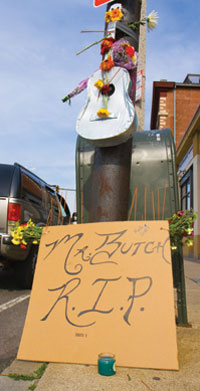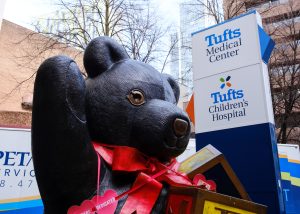Remembering Mr. Butch

September 9, 2007
Celebrity. It’s a pretty easy concept, right? We all know celebrities. They are those rich and sometimes talented people that we look up to, the people we revere. Celebrities are the people who show off their diamond-encrusted toilets on MTV Cribs. Celebrities are the people who drive erratically through the streets of Los Angeles and don’t get punished. They drive Bentleys and live in villas that overlook the Pacific. We drain our wallets to see them act, hear them sing, watch them dance.
But, does a celebrity have to be rich? Do they have to drive a Range Rover and wear Versace? The answer is no. A celebrity is a person who is celebrated. It is that simple. They don’t have to be rich, hell, they don’t even need to have a permanent roof over their heads.
It is not always the enviable wealth and privilege that makes a celebrity. Sometimes there is something about the person that causes them to be celebrated. Sometimes a man is “famous” simply for the man that he is.
Harold Madison Jr. is just such a man. No wealth, no privilege, yet, somehow he became a Boston celebrity. Before his death on July 12, 2007, Madison was a man beloved by generations of Boston’s college students and rockers. Dressed in a leather jacket with his more informal moniker, Mr. Butch, stitched across the back, he was a welcome sight in Kenmore Square for much of his 56 years.
As the 90’s gave way to the 21st century, Kenmore Square went from underground to uptown. The Rat, one of Boston’s seminal rock clubs, closed and upscale boutiques and a 5 star hotel sprouted in its place. Mr. Butch headed to Allston, a more student-populated, less judgmental area. He lived out his last years there before crashing his motor scooter into a light pole on Cambridge St. A life of eccentricity and freedom came to an end. But a legacy began.
Sure, he drank like a fish and reeked of the streets, but Mr. Butch was more than just any homeless man. An urban Thoreau, Mr. Butch lived life by his own rules, choosing the independence of the streets over the regimented life of modern society. Mr. Butch lived his life by a credo of compassion, spreading love and acceptance everywhere he went.
Mr. Butch was a homeless man, true, but he was also a reflection of the kindness that resides in mankind. Mr. Butch, even without a home, managed to find the brighter side of life in all that he did. In the most freezing of New England winters, Mr. Butch still had the warmest of hearts. We can all learn a lot from a homeless man. We can love more and tolerate more. We can all use a little Mr. Butch in our lives.











































































